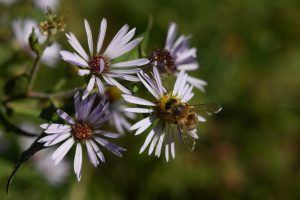Annabel Gibson
News Staff Writer
[email protected]
Bee City USA and Bee Campus USA, local nonprofit programs based in Asheville, recently surpassed 100 affiliates across the nation.
“Back in 2007, the breaking news around the world dominating the headlines was that the bees were dying, and they named it colony collapse disorder,” said Phyllis Stiles, founder and director of Bee City USA and Bee Campus USA. “My husband became a beekeeper, suddenly we had two hives in our backyard. I cheered him on and then he begged me to start keeping bees with him.”
Stiles started the official program in 2012, with Asheville being the first official affiliate.
“By the time we got to city council for the vote on June 26, 2012, we had a council chamber packed with people dressed like bees. It was just a real celebration,” Stiles said. “They unanimously agreed to be the inaugural Bee City.”
The organization focuses on raising awareness on the role pollinators play in communities and what people can do to provide them with healthy habitats.
“We are on a mission to change ornamental landscaping as we know it in America because we are at a place in our history where we think our landscapes should just be pretty and easy to maintain,” Stiles said.
The application process to become a Bee City or Bee Campus involves agreeing to various commitments, Stiles said.
“Both the campuses and the city have to host at least one annual awareness event about the importance of pollinator conservation and what it takes to have pollinator habitats,” Stiles said.
Cities and campuses also must have a pollinator habitat plan, which Stiles said entails having a recommended species list, a native plant and a least toxic pesticide plan.

“UNC Asheville became a Bee Campus to recognize the hard work of departments and individuals who had already been advocates for pollinators on campus and formalize our commitments to supporting pollinator health in the future,” said Jackie Hamstead, environmental specialist at UNCA.
UNCA recently hosted pollinator-related educational and outreach events, made new plantings and expanded the existing pollinator gardens on campus. The campus also developed the Integrated Pest Management Plan to minimize pesticide use and were certified as a Tree Campus.
“UNCA is one of the best Bee Campus USA affiliates in America because they have just done extraordinary work in making the campus pollinator friendly, and it’s all because of the grounds staff,” Stiles said.
It is still uncertain as to whether the declining population of pollinators will reverse, despite the efforts of Bee City USA, Bee Campus USA and other organizations established globally.
“All that we can say is we do know a lot of people are getting on the bandwagon and enhancing pollinator habitat and engaging lots of volunteers in the effort, because of Bee Campus USA and because of Bee City USA — we can say that,” Stiles said. “We’ve got the numbers to show that. But is it reversing pollinator decline? We won’t know that for years to come.”
According to Bee City USA, they encourage individuals and communities to start with the resources they have instead of spending capital on showplace gardens, as pollinators do not need showplaces; they need pollen, nectar and places to mate, nest and overwinter.
“As they are for many people, honeybees are gateway pollinators, just like the old joke about marijuana being a gateway drug to more serious drugs, the honeybees are a gateway pollinator and they get you really really interested in all of the other pollinators,” Stiles said. “After a couple years being a beekeeper and going to beekeeping meetings and seeing the movies about the decline of the bees and hearing nationally known speakers talk about it, I just got fed up.”
Stiles works alongside other members of the beekeeping community in Asheville, who helped her to start the nonprofit.
“It had an awful lot to do with Phyllis’ vision and mission and it was something that I thought really could make a difference,” said Diane Almond, a beekeeper and volunteer for Bee City and Bee Campus USA. “It wasn’t just a slogan or a clever idea, it was significant and meaningful. That’s really what made me become a part of it.”
To get involved with current opportunities relating to these issues, contact Jackie Hamstead at [email protected].


















